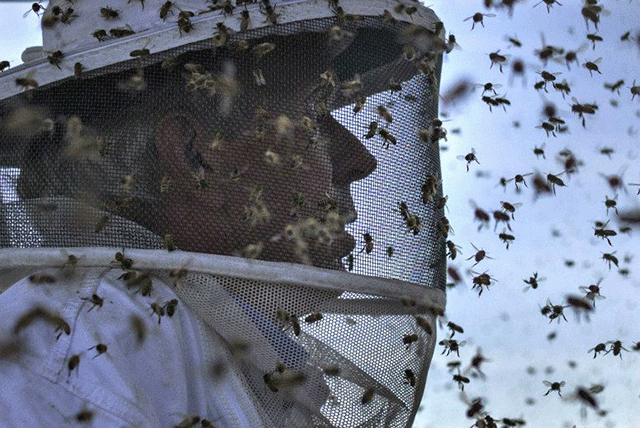"Sweet business" of beekeeping helps protect Zimbabwe's forests
The number of beekeepers is growing steadily and has topped 50,000 according to the Beekeepers Association of Zimbabwe

Divas Matinyadze's 47 beehives are hidden away in a dense patch of forest, along a narrow dirt path beside a small river in Mpudzi Resettlement Scheme.
"If you cut a tree anywhere near my beehives, you are assured of trouble from me," chuckled Matinyadze. "These trees belong to my bees".
He carefully inspected one of the traditional hives, fashioned from a dead tree trunk, warning in a whisper: "Don't come close - the bees are only used to me and can easily be upset."
In this part of eastern Zimbabwe, vast tracts of land have been cleared over the past decade, mostly by tobacco farmers who use firewood to cure their crop.
DiCaprio took up beekeeping to handle stress
Efforts by the government to encourage those farmers to plant and maintain their own woodlots for a ready supply of fuel have gained little traction.
Up to a fifth of the country's 330,000 hectares (815,448 acres) of natural forest is cut down by tobacco farmers each year, according to Zimbabwe's Forestry Commission.
Selling firewood has also become big business for rural and peri-urban communities due to the frequent power outages experienced in the country.
But there are greener alternatives for making a living, experts say, such as beekeeping.
Every district now has flourishing beekeeping projects, sustaining thousands of households. The number of beekeepers is growing steadily, and has topped 50,000, according to the Beekeepers Association of Zimbabwe.
Beekeeping is fast becoming a profitable activity thanks to high domestic demand for honey as a food and other products such as beeswax which is used to make candles, the association says.
In wheat-dominated area, a Pakistani farmer grows grapes
Beekeeping is also proving an innovative way to protect forests.
"As beekeepers we jealously look after the environment because beekeeping depends on good water sources and good forage for pollen," Matinyadze said. "There are lots of trees where my beehives are."
Matinyadze was taught beekeeping under a programme initiated by the government's Department of Agricultural Technical and Extension Services (Agritex).
International organisations have also been involved in training beekeepers, and processing and marketing honey, including development charity World Vision Zimbabwe and the EU-funded Forest Forces project.
Drought hits crops
With weather patterns becoming more erratic, harvests from rain-fed agriculture are increasingly unreliable, forcing many farmers to look for other ways to keep up their income.
This year, the country suffered one of the worst El Nino-induced droughts in history, hot on the heels of a devastating drought in the 2014/15 farming season.
The impact on agriculture has left more than 4.5 million Zimbabweans without enough to eat this year, according to the government, which estimates at least $1.6 billion is needed to feed them.
Before switching to beekeeping, Matinyadze was a successful cotton and maize farmer, but he abandoned those crops for bees in 2014.
The results have been encouraging. "Beekeeping is profitable - it's a sweet business," he said.
Matinyadze earns up to $60 per beehive during the honey harvest twice a year. He can afford to buy food for his family, but is quick to add that the current drought has cut honey production.
"I have delayed my March harvest as there is little pollen, but the effect of the drought has not been as bad on my bees as it was on my crops," he noted.
Buzz off
Another beekeeper in Chipinge district, Isaac Mamboza, told the Thomson Reuters Foundation he had joined a group of 25 to start a beekeeping project.
"We have discovered that beekeeping can help to protect our forests," Mamboza said. "Most of our beehives are on trees near our dam - no one will tamper with (them)."
Amon Vhumbu, a traditional leader in Chipinge, said his community was looking at ways to incentivise forest conservation through beekeeping.
"Beekeepers are protecting our forests at the same time as making money out of the initiative," he said.
Traditional leaders see themselves as custodians of natural resources in rural communities. "We take protection of our environment seriously - anyone caught cutting down a tree in this area is heavily fined," Vhumbu said.
In full bloom: Mustard crop paints Hazara yellow, brightens farmers’ day
Bee enthusiast Mathew Matongwani said every modern beekeeper needed to maintain a forest plot in which to place their beehives.
"Apart from the business of honey, beekeepers are committed to protecting and conserving the forests from anyone who causes fire outbreaks, or wood poachers," he said.
Matongwani gained significant beekeeping experience when working for Environment Africa, a regional organisation that has assisted thousands of beekeepers through green action groups.
"Water flow in some rivers has improved significantly as a result of conservation of catchment areas by local beekeepers," Matongwani said.



















COMMENTS
Comments are moderated and generally will be posted if they are on-topic and not abusive.
For more information, please see our Comments FAQ